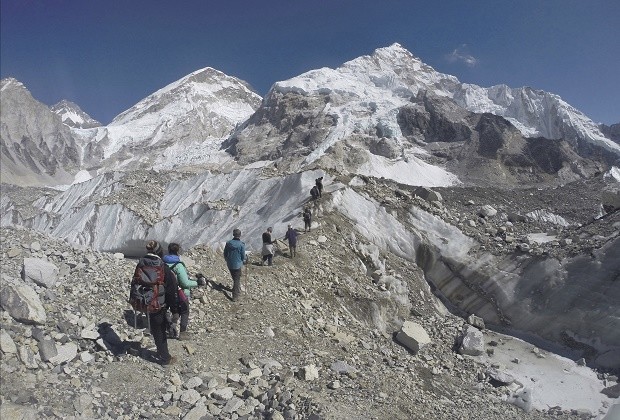Nepal hints at easing ban for differently-abled climbers

In this Feb. 22, 2016 file photo, international trekkers pass through a glacier at the Mount Everest base camp, Nepal. Nearly 300 people have died on Mt. Everest in the century or so since climbers have been trying to reach its summit. At least 100 of them are still on the mountain, perhaps 200. AP FILE PHOTO
Tourism Minister Jitendra Narayan Dev has hinted at plans to revoke the order tightening rules for differently-abled people from attempting to climb Mt Everest.
The minister had dropped a hint to the delegation of different organizations like National Federation of Disabled Nepal, Independent Living and Blind Rocks to whom he met on Friday. The delegation also includes double amputee Hari Budha Magar who lost his legs in an IED (improvised explosive device) blast in April 2010 in Afghanisthan and has been training for several months to scale Mt Everest.
“The minister is leaning towards revoking the order or amending the clause restricting the differently-able people to climb the mountain,” said Magar. “The minister has realized that not enough homework was done before implementing the current rules,” he said, adding that the minister has asked the organizations working with the differently-abled people to submit a joint memorandum based on which amendments can be changed. “We will be submitting the memorandum next week,” said Magar, who was forced to postpone his plan of climbing Everest to 2019 after the government’s ban.
On December 28 last year, the Cabinet’s Bill Committee had approved an amendment to the Mountaineering Expedition Regulation under the Tourism Act, prohibiting double amputees, persons without arms and legs and blind persons from attempting to climb the world’s tallest peak. The government’s decision to ban blind climbers from joining Everest expeditions has run into flak from the National Federation of the Blind, the World Blind Union and the National Federation of the Disabled, Nepal who have called the move ‘discriminatory’. The National Federation of the Blind and the World Blind Union represent the US and global blind communities respectively.
Mark Riccobono, president of the federation in its statement had said: “Despite the wide-ranging evidence of our capacity, however, society continues to arbitrarily restrict what we may do, and low expectations continue to create artificial barriers that prevent us from fully participating in our communities.”
Article continues after this advertisement“There is no more evidence that we should not climb Mt Everest than that we should not walk the streets with our white canes, ride amusement park attractions, or raise children, all of which are things that some have tried to prevent us from doing, but which many of us have done successfully.”
Article continues after this advertisementMagar, 38, served in the 1st Royal Gurkha Rifles. Despite losing his legs, he is determined to make his ascent and become the first person with above knee amputations to summit Mt Everest. He had planned to be accompanied by the Conquering Dreams team—an expert team of friends, including Royal Gurkha, US Marine Corps and Navy Seal veterans. “Tourism Minister Dev is showing positive hints at revoking the order. But if the government fails to give equal treatment for the differently-abled people, we will have to fight a legal battle,” said Magar. “To win the rights, it might be another Mt Everest for us but we will keep on fighting for our rights.”
Some mountaineering officials said that the decision was taken in haste. Everest climbing records show that fewer physically challenged climbers have been involved in accidents as they often hire more climbing guides for their safety compared to other climbers. The Disability Rights Act passed by the Legislature-Parliament last August prohibits all kinds of discrimination on the basis of disability with the provision of action and punishment against such practices.